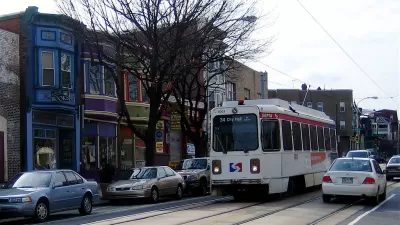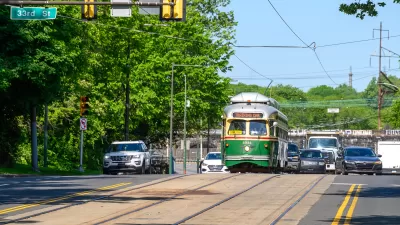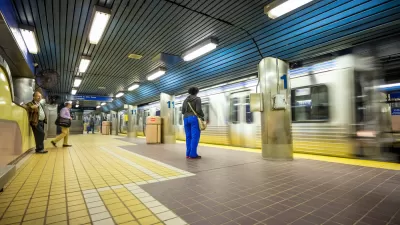The transit agency must renew its search for an appropriate facility for an expanded trolley barn as part of its plan to modernize its aging fleet.

According to a report by Ryan Briggs and Darryl C. Murphy for WHYY, "plans for a new SEPTA [Southeastern Pennsylvania Transportation Authority] trolley barn in Southwest Philadelphia — meant to support a larger overhaul of its aging light rail fleet — are on hold due to a competing proposal from online mega-retailer Amazon to build a new warehouse at the same location." Although SEPTA had started the process of securing ownership of the site, "PlanPhilly confirmed the agency has been effectively outbid by Amazon," with SEPTA's Assistant General Manager for Public & Government Affairs Fran Kelly quoted as saying the agency must go "back to the drawing board" to find a suitable location for its facility.
"The collapsing land deal comes as the agency faces a broader decline in ridership and revenue due to the coronavirus pandemic. It is also a setback for what would have been a major first step toward a long-planned overhaul of the trolley network," a $1.6 billion modernization plan that "has made little progress" since its inception. Vincent Thompson, spokesperson for City Councilmember Kenyatta Johnson, "described the facility as a 'last mile' logistics site that could potentially host hundreds of jobs to a section of the city with above-average unemployment." Critics of the e-commerce giant dispute the benefits of an Amazon facility in the neighborhood. According to Kendra Van de Water, co-founder of YEAHPhilly, "the employment opportunities Amazon would bring to her neighborhood are part of a predatory strategy, where employees, many of them young people, are caught in a 'hamster wheel of survival.'"
Amazon did not respond to a request for comment. "The retailer is due to appear at another Civic Design Review meeting on April 6 and is negotiating a community benefits agreement."
FULL STORY: Primed: New Amazon warehouse derails land deal for SEPTA trolley facility

Maui's Vacation Rental Debate Turns Ugly
Verbal attacks, misinformation campaigns and fistfights plague a high-stakes debate to convert thousands of vacation rentals into long-term housing.

Planetizen Federal Action Tracker
A weekly monitor of how Trump’s orders and actions are impacting planners and planning in America.

San Francisco Suspends Traffic Calming Amidst Record Deaths
Citing “a challenging fiscal landscape,” the city will cease the program on the heels of 42 traffic deaths, including 24 pedestrians.

Defunct Pittsburgh Power Plant to Become Residential Tower
A decommissioned steam heat plant will be redeveloped into almost 100 affordable housing units.

Trump Prompts Restructuring of Transportation Research Board in “Unprecedented Overreach”
The TRB has eliminated more than half of its committees including those focused on climate, equity, and cities.

Amtrak Rolls Out New Orleans to Alabama “Mardi Gras” Train
The new service will operate morning and evening departures between Mobile and New Orleans.
Urban Design for Planners 1: Software Tools
This six-course series explores essential urban design concepts using open source software and equips planners with the tools they need to participate fully in the urban design process.
Planning for Universal Design
Learn the tools for implementing Universal Design in planning regulations.
Heyer Gruel & Associates PA
JM Goldson LLC
Custer County Colorado
City of Camden Redevelopment Agency
City of Astoria
Transportation Research & Education Center (TREC) at Portland State University
Jefferson Parish Government
Camden Redevelopment Agency
City of Claremont




























